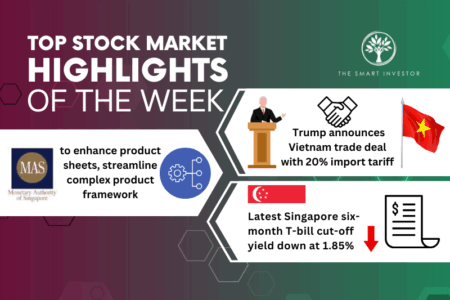As a tiny island state, Singapore faces a multitude of threats from climate change.
Rising sea levels, food security, water resources and public health are just some of the areas that climate change can have a devastating impact on.
To help combat this crisis, the world needs to urgently reduce its carbon footprint.
Locally, the Singapore government has announced that Singapore will raise taxes sharply on greenhouse gas emissions, from the current S$5 per tonne to S$45 per tonne by 2027.
As individuals, we can also join the fight in several ways, such as recycling and reducing electricity usage.
But now, you can also do so with your investments.
Local lender OCBC Bank Ltd (SGX: O39) has announced the launch of the Lion-OCBC Securities Singapore Low Carbon ETF, with a target listing date of 28 April 2022.
But before you take part in Singapore’s journey to decarbonization with this ETF, note take of these key facts (figures are as of 31 March 2022, unless otherwise stated):
- The objective of the ETF is to replicate the iEdge-OCBC Singapore Low Carbon Select 50 Capped Index. The Index tracks the 50 largest globally-listed Singapore companies by free-float market capitalization.
- The Index excludes companies with high involvement in the fossil fuel industry, and also takes into account each company’s carbon intensity score.
- Carbon intensity refers to the amount of carbon dioxide (CO2) emitted per US$1 million of company revenue. The metric is calculated by Sustainalytics, a specialist in environment, social and governance (ESG) investment research.
- Each index constituent has a weightage cap of 7%. However, companies with a market capitalization of above US$200 billion have a higher weightage cap of 10%.
- The Index is rebalanced semi-annually, in March and September. In between rebalancing dates, market movements may cause index constituents to exceed the weightage cap.
- The three local banks, United Overseas Bank Ltd (SGX: U11), OCBC and DBS Group (SGX: D05) are the three largest components of the ETF, with weights of 7.2%, 7.1% and 7.1% respectively. They are followed by Singapore Telecommunications Ltd (SGX: Z74), or Singtel, which occupies 7.1%.
- Real estate is the largest sector represented in the ETF, occupying a 28% weight. The next largest segments are financials and technology, with respective weights of 25.9% and 14.3%.
- The ETF will have a board lot size of just one unit, lowering the barrier for younger investors and increasing flexibility with how investors deploy their cash.
- Based on backtesting, for the five years up till 31 December 2021, the underlying Index has delivered a total return of 11.59%.
- The fund’s expense ratio is capped at 0.45% per annum for the first two years from the inception of the ETF.
Get Smart: Best of both worlds
The Straits Times Index (SGX: ^STI) contains the 30 largest companies listed on the Singapore Exchange (SGX: S68).
Known to be a barometer of the Singapore stock market, ETFs that track the STI are a popular option for investors looking to invest in local blue-chip companies.
However, the STI may not offer the best diversification for your portfolio.
The 3 largest companies, DBS, OCBC, and UOB, are all financial services companies and they take up over 44% of the STI’s allocation.
This means that the STI’s returns could be disproportionately affected by the performance of the local banks.
In contrast, the new Lion-OCBC Securities Singapore Low Carbon ETF has an expanded list of 50 companies, with the local banks only occupying slightly more than 21% of the total weight.
The ETF also consists of Singaporean technology companies listed overseas, such as Sea Ltd (NYSE: SE) and Razer Inc (SEHK: 1337).
Hence, buying this ETF is a great way for you to diversify your Singapore investments.
At the same time, you would be contributing to Singapore’s decarbonization goals, allowing you to enjoy the best of both worlds.
In our special FREE report, Top 9 Dividend Stocks for 2022 – and 3 Tactical Shifts to Maximise Your Profits, we’re revealing 3 special categories of stocks that are poised to deliver maximum growth in 2022 and beyond.
Our safe-harbour stocks are a set of blue-chip companies that have been able to hold their own and deliver steady dividends. Growth accelerators stocks are enterprising businesses poised to continue their growth. And finally, the pandemic surprises are the unexpected winners of the pandemic.
Download for free to find out which are our safe-harbour stocks, growth accelerators, and pandemic winners! CLICK HERE to find out now!
Follow us on Facebook and Telegram for the latest investing news and analyses!
Disclosure: Herman Ng owns shares of Sea Ltd.




